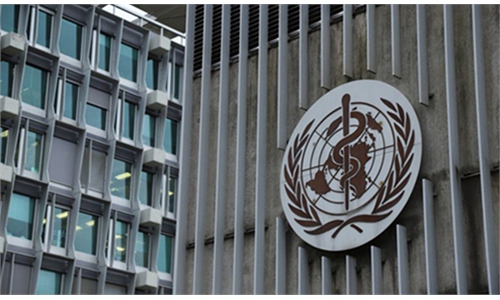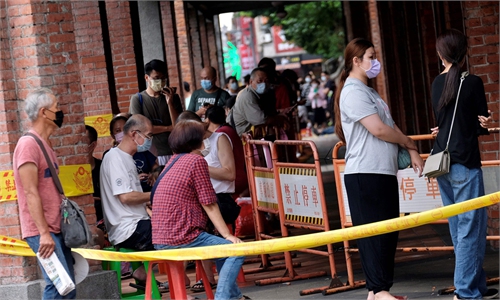Separatist DPP makes a pariah of itself at WHO despite manipulative social media campaigns to slander mainland
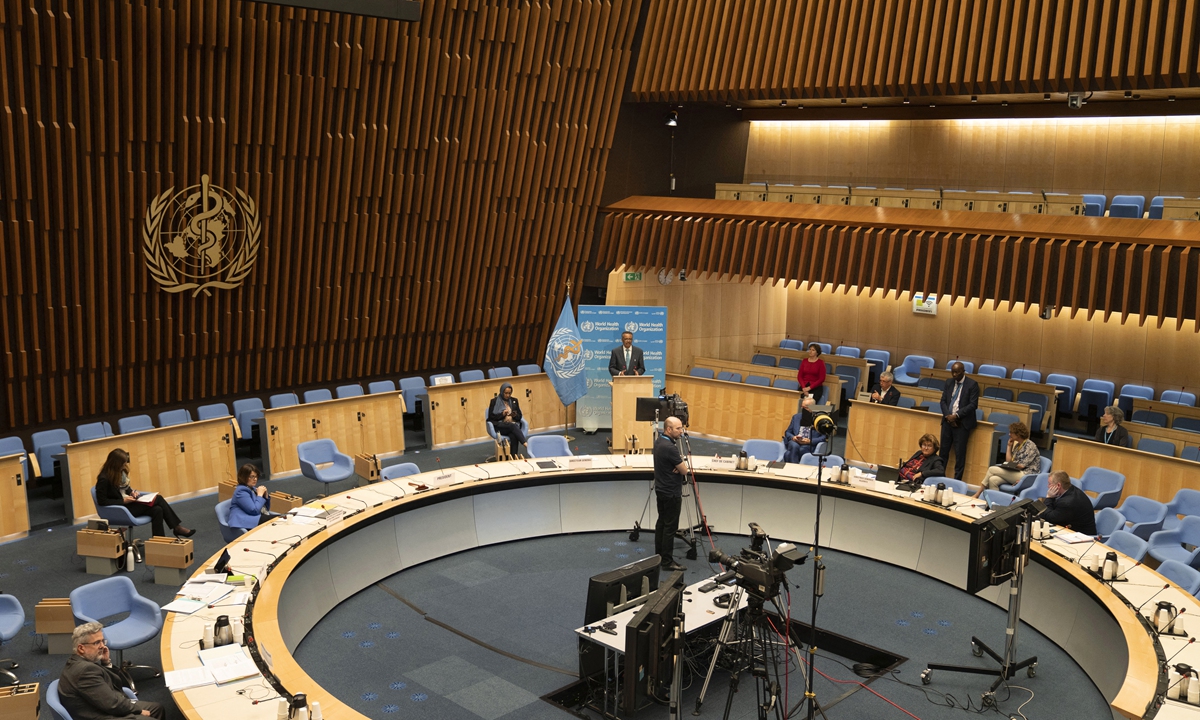
The World Health Organization assembly room with WHO Director-General Tedros Adhanom Ghebreyesus delivering a speech in May 2020 Photo: AFP
Although it is now a foregone conclusion the island of Taiwan has been once again ruled out of this year's World Health Assembly (WHA) and will continue to be excluded in the foreseeable future if it does not return to the one-China principle, some organizations that have worked hard for Taiwan's accession still grumble bitterly.
Due to the COVID-19 pandemic, the WHA will be held virtually from Monday to June 1, Taiwan island has not been invited to participate in the event, the fifth year that the decision-making body of the World Health Organization (WHO) has denied the proposal initiated by the US and a handful of other countries.
Ironically, at a time when the Democratic Progressive Party (DPP) authorities in Taiwan have failed to control the virus and the island sees a record COVID-19 surge, a number of self-claimed nongovernmental organizations (NGO), especially those with tentacles from Western countries, have still brazenly launched the so-called "hashtag diplomacy" campaign, using hashtags like "Let Taiwan Help" and "Taiwan is Helping" on Twitter to propagate the DPP's pursuit.
Some associations and "NGOs" have been playing an increasingly bigger role in Taiwan's external relations in recent years, hyping Taiwan's "contribution" to the world and actively colluding with European and American politicians with an "anti-China" mentality, to implement the DPP's strategy to garner attention at an international stage for its secessionist purpose, Sheng Jiuyuan, director of the Taiwan Research Center at the Shanghai Academy of Social Sciences, told the Global Times on Monday.
According to the Chinese Foreign Ministry, this year, more than 150 countries have expressed support for the Chinese mainland's decision to oppose Taiwan's participation in the WHA. Over 80 WHO members sent letters to the WHO to express their commitment to the one-China principle.
Speculation campaign
The Formosan Association for Public Affairs (FAPA), for example, recently participated in and promoted the online hashtag "Let Taiwan Help", which was launched by the US Senate and House Foreign Relations Subcommittees on Asia to advocate for Taiwan's inclusion in WHA, with over 60 US lawmakers tweeting it in a day.
FAPA labeled itself an educational US-based nonprofit organization that "provides US policymakers, the media, scholars, and the general public with information on issues related to Taiwan." However, the Global Times found that the "Newsroom" on FAPA's website is filled with a large number of articles discrediting the Chinese mainland, which said the mainland bullies the international community and plays politics with the lives of the people of Taiwan.
FAPA has also actively interacted with the Inter-Parliamentary Alliance on China (IPAC), an organization trying to unite parliamentarians from Western countries to boycott the Chinese mainland on affairs related to Taiwan, Xinjiang and Tibet regions, to further play the "human rights card" for slandering China and politicize global health issues in more parliaments in Europe and other continents.
In France, Association Formose en France (AFF) publicly called for Taiwan to take a new "health diplomacy" path to grab the world's attention.
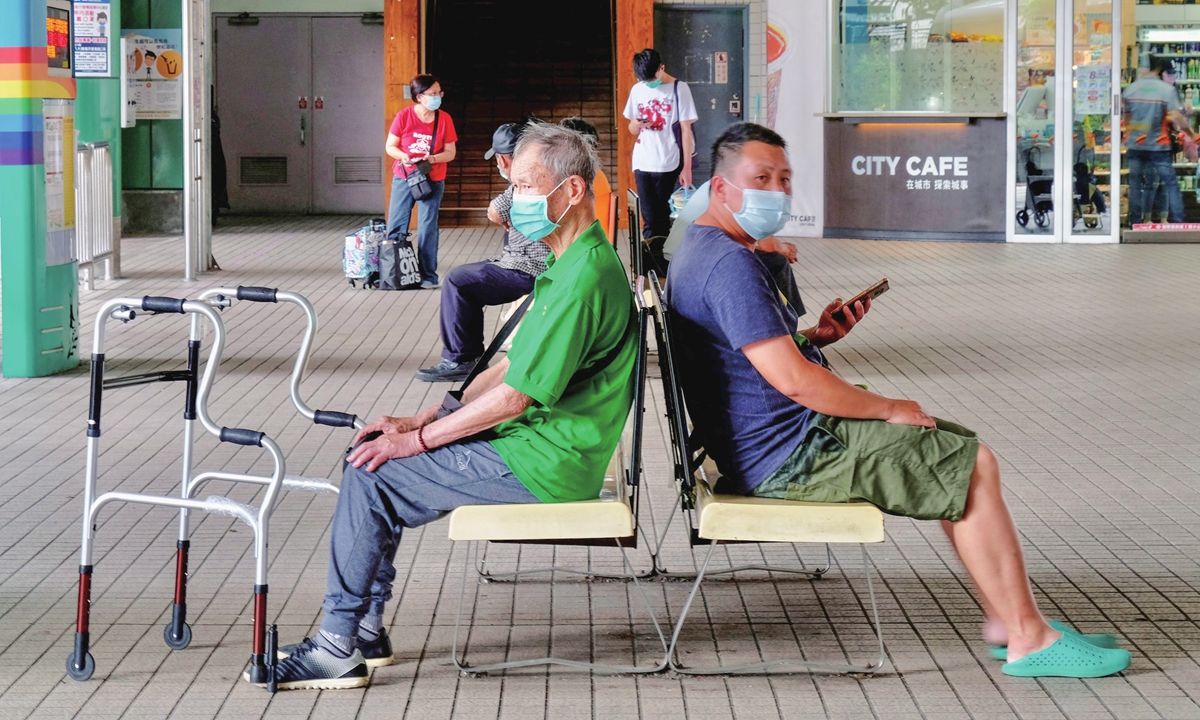
Local residents wearing masks wait for buses in New Taipei City on May 15. Photo: AFP
AFF has long worked for rallying overseas pro-independence Taiwan residents and seeking the connections and support of the local community in France and other European countries to support Taiwan's participation in the WHO as an independent country.
In several recent forums and webinars organized by AFF, Taiwan's anti-mainland politicians have trumpeted the French Senate's support for Taiwan's attending of the WHA and claimed that the ultimate exclusion was a denial of Taiwan's human rights due to pressure from Chinese mainland.
Sheng noted that the DPP authorities and its acolytes have been deliberately confusing the international society by claiming that only the acceptance of Taiwan by the WHO would be a successful example of international cooperation against the pandemic.
"The DPP insists on participating in the WHA as an independent country, which is the real manipulation of politics," he added.
According to the Chinese Foreign Ministry, since the early stages of COVID-19, the Chinese Central Government has given the Taiwan region 260 notifications about the situation and approved health experts from Taiwan to participate in WHO technical activities 16 times.
Representatives of the Hong Kong and Macao special administrative regions attended the 74th session of WHA as members of the Chinese delegation, the Xinhua News Agency reported.
"WHO's decision once again shows that pursuing 'Taiwan independence' is doomed to fail, and hyping up Taiwan affairs in the international stage is unpopular," Zhu Fenglian, spokesperson of the Taiwan Affairs Office of the State Council, said on Tuesday.
True colors of the NGOs
Observers have pointed out that although these groups usually masquerade as objective and independent NGOs, they are actually anti-China lobbies serving the interests of Taiwan island's secessionist authorities and have a complex collusion of interests with Western anti-China forces.
FAPA was founded in 1982 in Los Angeles by a group of "Taiwan independence" activists. In 1993, FAPA updated its charter to confirm that the most important purpose of the organization is to gain international support to make Taiwan an "independent and democratic country."
According to the statement of the then FAPA president, Peter Chen, since the late 1990s, FAPA has been unceasingly advocating in the US for Taiwan's membership to WHO and has continually urged Taiwan authorities to establish an "allies front" to contain the Chinese mainland.
In 2003 and 2004, former regional leader of Taiwan, Chen Shui-bian, once instructed the Taiwan "foreign affairs department" to send US$800,000 as a "secret diplomatic fund" to FAPA. However, some of the money was pocketed by Chen Mi-ching, brother of former FAPA president Chen Wen-yan, which then became a major blot on Chen Shui-bian's corruption case.
FAPA has been primarily lobbying pro-Taiwan members of the US Congress to defend Taiwan authorities, whose members have often traded interests with US lawmakers through election contributions, said Taiwan affairs scholars.
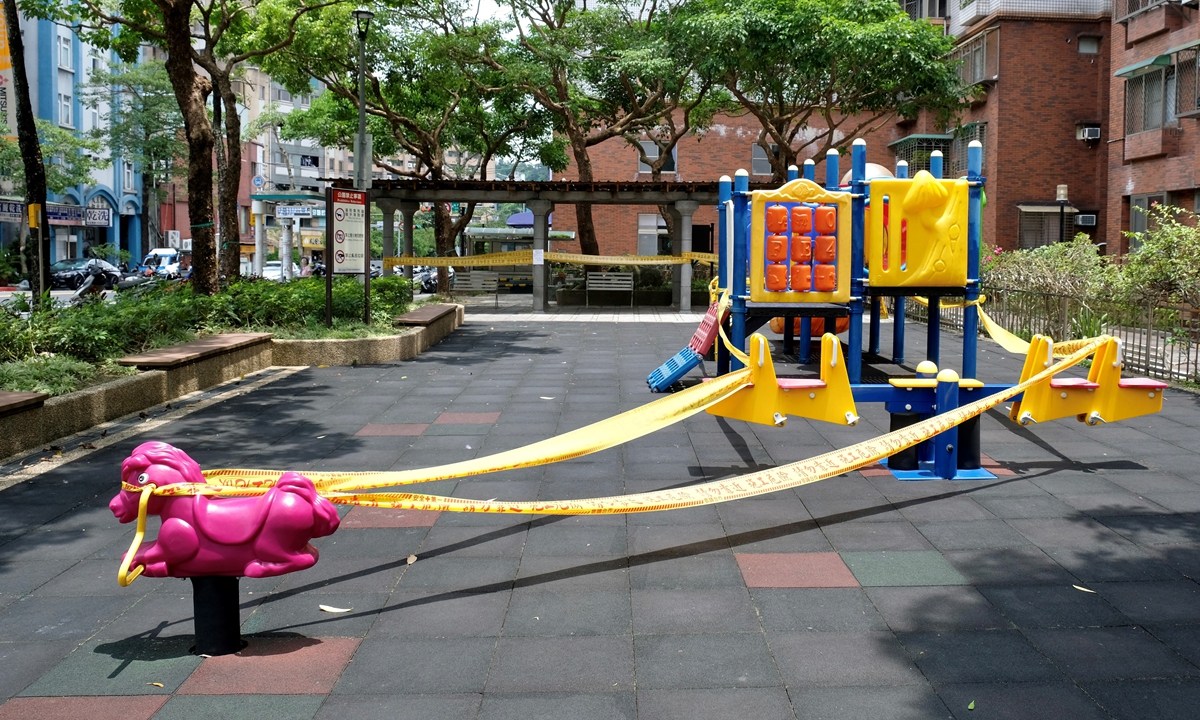
A community park, closed due to social distancing measures following a spike in COVID-19 cases, is seen in Taipei on May 22. Photo: AFP
Wang Kenjohn, then president of the FAPA, wrote in his memoirs that he had helped raise campaign funds for numerous politicians.On AFF's Facebook page, their aim of "upholding the self-determination of Taiwan people, safeguarding Taiwan's 'sovereignty' and 'national dignity'" is also prominently displayed.
The Global Times also found that AFF has close ties with the Taipei representative office in France. The "Taiwan Representative to France" Wu Chih-chung, who has been openly claiming himself "as being the pseudo-ambassador," is a regular at lectures and forums that AFF holds.
Under the long-term support of the Taipei Representative Office in France, AFF and other groups have maintained close interaction with anti-China news outlets and lawmakers in Europe.
Some politicians in Europe and the US are sparing no effort to endorse these Taiwanese institutions, which used Taiwan as a pawn against the mainland authority, while at the same time satisfying their selfish demands, Sheng noted.
What's more, Western media's coverage of the latest epidemic surge in Taiwan is obviously biased, which fully reflects the double-standard and anti-China nature of some Western media, he added.
"These hyping and smear tactics sound more like self-vaunting and cannot reflect the real public opinion, but proved that there has been little room for Taiwan to conduct official diplomacy based on the far widely recognized one-China principle," Sheng said.
Instead of racking their brains to develop innovative "diplomatic channels" with "medical assistance," the Taiwan authorities should first bring the local epidemic under control and give a good response to the domestic public, he added.
